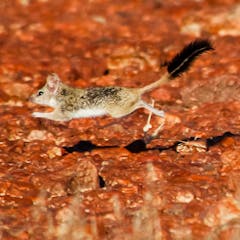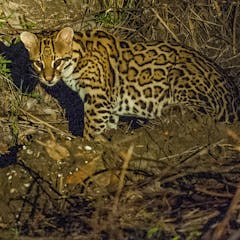
Articles on Endangered animals
Displaying 1 - 20 of 53 articles

New research documents how drones were used to track the temperatures of the Bay Islands anole lizard on the Honduran island of Utila.

Blink and you’ll miss it. The kowari is a charismatic marsupial carnivore that needs our help.

Australian freshwater turtles are a vital part of healthy waterways, but we don’t know enough about them. A new roundup of turtle research aims to buck the trend.

As COP28 looks for solutions to the climate crisis, retaining biodiversity is crucial to the planet’s future. But not every species can be saved from extinction. Here’s one approach.

Great crested newts cause expensive delays to construction – trained sniffer dogs may offer a solution.

Unusual human-wildlife interactions raise questions about managing the risks. What’s driving these wacky whale antics? How and when should we intervene?

The diets of Tasmanian devil are narrowing in areas where humans have changed the landscape. This has big implications for conserving the species.

Most of Iran is wild and beautiful, but development threatens to degrade highly-prized ecosystems. Now new research is honing in on the hotspots, to preserve biodiversity in expanded protected areas.

You might think of bunnies as ubiquitous, but it’s actually a relatively small group of species – and many of them are unique, little-known, and in trouble.

Mountain environments are rich in plant and animal species, but the dual threat of human habitation and climate change means urgent action is needed to protect them.

The embryo is frozen in liquid nitrogen until a suitable female donkey is found to grow it into a baby.

Do you know zoopharmacognosy is? Some animals use trees to treat themselves.

There are so few wild ocelots in the US that the cats are becoming inbred, with a bad prognosis for their ultimate survival. But researchers are perfecting ways to get new genes into the population.

Between 250 and 200 million years ago, a whole host of bizarre horseshoe crabs had evolved in two distinct groups. Only one of these groups survives.

Saving our threatened species shouldn’t be seen as a cost, but rather a very savvy investment to ensure the support systems sustaining life on Earth remain intact.

Planting trees can sometimes be a carbon-offset box-ticking exercise, but reforestation is a long-term commitment that supports communities, promotes biodiversity and tackles the climate emergency.

Scientists and bureaucrats moved logistical mountains to rescue the eastern bristlebird from bushfires this year. As climate change worsens, wildlife evacuations will become more common.

The story of the Kangaroo Island Micro-trapdoor spider offer insight into the challenges ahead for invertebrates – the tiny engines of Australia’s biodiversity – after this year’s cataclysmic fires.

I’ve worked in threatened fish conservation and management for more than 35 years, but this species is special to me.

The Kaputar rock skink is thought to have have one of the smallest ranges of any reptile in New South Wales – at the summit of a single extinct volcano, Mount Kaputar.
